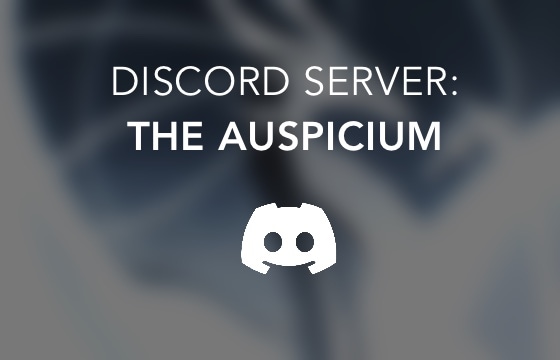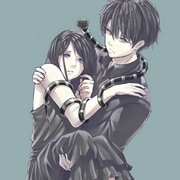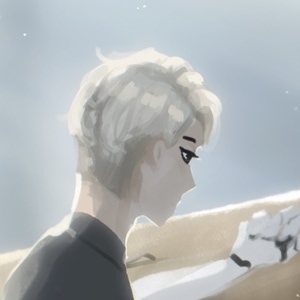Eyrin’s fairly sure he jumps out of his skin. He whirls around to see T’kri standing right behind him, arms folded behind their back. Their expression is blank.
“Please don’t sneak up on me like that, holy shoots,” Eyrin breathes out, placing a hand over his heart. “And—you’re still here? I thought you left.”
“I went exploring.” T’kri tilts their head. “Your residence is quite large, especially for a single person.
Eyrin glances at T’kri’s abdomen. “Your injury, though…?”
“It does not impede my ability to walk.”
Fair enough. “How long were you standing here?” he asks, raising an eyebrow. “With government agents right at our doorstep, even.”
T’kri blinks. “I was in the room by the end of your call, though I only approached just now.”
Eyrin makes a face. What kind, he isn’t sure—confuddled might be a good word. “I didn’t see you, though?” And for that matter, neither did the agents.
T’kri answers by lifting a hand. It glows faintly blue before it starts turning invisible right before his eyes. There’s a faint distortion, but Eyrin wouldn’t have noticed if he didn’t see the change himself.
Without thinking, Eyrin steps forward and takes the invisible form into his hand. It’s smooth and cool, much like the way T’kri’s abdomen felt when they revealed their black underskin. “Amazing,” Eyrin murmurs. He presses their palms together, and it looks like his palm is pressing against nothing. “Is this you or your technology?”
T’kri hums softly, but says nothing for a few seconds. Taking it as hesitation, Eyrin quickly withdraws his hand. “Ah, it’s fine if you don’t want to say…”
“It is both,” T’kri says, lowering their hand as it returns to a human color. “We use augmentation technology to both enhance our natural abilities and provide us with additional capabilities.”
Eyrin’s eyes widen. “Really? Is it something like nanotechnology?” Silas has been looking into that technology with varying degrees of success, and nano-augmentation is certainly something he’s been trying to achieve.
T’kri hums again, looking off to the side as if trying to recall a memory. Come to think of it, that might not be too far off—if they’re Eyrin’s memories. “I believe it is something like that, yes,” they say eventually, nodding.
“That’s neat,” Eyrin says quietly. He finds himself burning to ask more questions about their technology, but T’kri doesn’t seem terribly eager to share. So Eyrin gathers himself and instead asks, “So you went exploring around the house?”
“Correct.” They tilt their head slightly. “However, I admit I do not fully understand the purpose of many of your contraptions.”
Eyrin blinks. “I could, uh… show you?”
“Would you?” T’kri tilts their head further.
“Why not,” Eyrin says, like showing an alien around his house is the most natural thing in the world.
T'kri nods. "Very well, then. Lead the way." They lift a hand to gesture towards the rest of the house.
Eyrin proceeds to show them around, and it’s interesting to see what T’kri does and doesn’t know about. They know what everything is, and they know what they’re used for in at least a vague sense.
Eyrin is incredibly amused to find that they don’t know how to tell which way doors are supposed to swing open—though they learn quickly enough. It’s as though they’re some kind of supercomputer that learns things in the blink of an eye.
Showing them the bathrooms is… fun. T’kri is fascinated by the toilet-flushing mechanism. They try to eat the toothpaste, though Eyrin quickly puts a stop to that.
Eyrin brings them to the kitchen, too, and has them try a bunch of snacks. The results are certainly interesting—fair, given that they more or less have to learn taste from scratch. As it turns out, T’kri can’t stand anything bitter or sour (their face pinches in clear disgust), while they’ll respond to anything sweet, salty, or savory with a contemplative expression followed by a hesitant judgement on whether they like it or not.
After the brief kitchen tour, Eyrin takes T’kri to what he calls his “workshop”—a studio room with tall glass windows on one side that offer a view of the lake, and a large door on the other side that opens to a garage that Eyrin mostly uses for storage. There’s a large wooden table with some devices Eyrin’s been working on, and he shows them to T’kri: the old radio, a computer, and a malfunctioned prosthetic arm. The previous owner had gotten a newer model, and Anima didn’t have much use for it besides recycling the materials. Also on the table and throughout the room are various mechanical tools, and Eyrin gladly demonstrates how a few of them work when T’kri asks.
The alien soon turns their attention to the prosthetic arm. They give Eyrin a questioning look, arm lifted over it. “May I?”
Eyrin nods, and T’kri takes the device into their hands. It’s covered with a white plastic shell with black seams peeking through, much like Eyrin’s own prosthetics. It goes up to the middle of the bicep, where a few wires are sticking out of the removed port.
“Is this the same type of device you use?” T’kri asks.
Eyrin holds his forearms crossed in front of his chest. “More or less. Both are made by my cousin’s company, though mine is older in some ways, newer in others.”
T’kri hums, bending the fingers of the hand. Since the arm isn’t active, the movements are very stiff. They soon set it back down before turning their gaze to Eyrin, then to his legs.
Eyrin shifts in discomfort. Normally, he doesn’t like it when people do that. When he tells them his legs aren’t his original ones, and they look at him and his legs that aren’t quite his. When people see him as his missing pieces. T’kri was no exception earlier today, but now… something seems different. T’kri seems to regard them with the same curiosity he held for the door mechanisms, and Eyrin finds himself taking a breath and offering, “Do you want to see them?”
T’kri blinks. Surprised? “If it is not too much trouble,” they say. “I am curious. My kind, especially augments such as myself, can regenerate limbs and lost parts—barring exceptional circumstances. Our ‘prosthetics’ when they are necessary are semi-biological as well.”
“Interesting,” Eyrin murmurs, sitting down on the bench at the table. “Are only some of you augmented, then? How common is it?”
“Quite common, actually.” T’kri sits down next to Eyrin. “It significantly improves our life quality, and our Zrekta ensures it is accessible to all.”
Eyrin blinks, pausing from where he was starting to roll up his pant leg. “Your what?”
“Ah, yes. Hm.” T’kri leans back on the table, looking off into the distance. “They—I suppose a neutral term is best—are our leader, more or less. They are responsible for many decisions that affect our society, though there are others immediately below them that they may give various responsibilities to.”
Eyrin nods. “A bit like a president, then?”
“Yes, I suppose so.”
Eyrin hums, finishing with rolling up his pant leg before moving to the other. “Were they the one who sent you here?”
“That is correct,” T’kri confirms. “It is rare to find another planet with intelligent, civilized life. I was sent to determine what the best approach to handle your kind would be.”
Eyrin can’t help wincing at the realization that their first interaction was most likely getting shot down. Still, he can’t help his curiosity, so, resting his hands on his now-bare knees, he looks back up to ask, “So… there are other aliens?”
T’kri nods. “Yes. There are a number of,” they pause, looking off to the side briefly before meeting Eyrin’s eyes again, “superpowers, if you will, in the intergalactic ecosystem. The leaders may convene on occasion to discuss decisions that would affect us all, but we are more or less afforded free reign regarding how to handle the discovery of new civilizations within our sectors.”
“So I guess we’re in your purview, huh.” Eyrin bites his lip. “How do you usually handle other civilizations?”
T’kri looks out of the window across the room before answering. “If they are likely to enrich our intergalactic ecosystem, whether culturally, technologically, or economically, we reach out and begin friendly relations. We assist them in developing spacefaring technology, and defend them from any threats from beyond the planet. It is an investment to their future contributions.”
“That sounds… great, actually,” Eyrin says. He pulls his left foot up to his right knee, putting his hands on his ankle and left knee. “And if they’re not?”
T’kri hums. “We defer making a decision, in some cases. We wait longer before establishing contact, continuing to observe.”
Eyrin frowns. “And then?”
The corner of T’kri’s mouth quirks up in something like a wry smile, turning back to Eyrin. “What do you think, Eyrin?”
“I think,” Eyrin says, looking down at his hands and gripping himself, “since you mentioned a possible war, and preventing harm only from coming to me…” He looks up, meeting T’kri’s eyes. “You’d destroy those civilizations.”
T’kri smiles. It’s not a happy smile—rather, there’s something uncanny about it, something inhuman. “Only if they’re a threat to the well-being of the intergalactic ecosystem.”
A laugh escapes Eyrin, a bitter sound. “Considering we shot you down and have a long history of killing each other and fighting over the most pointless things…” Eyrin puts a hand on his face. “Are you going to tell your civilization to kill us all?”
T’kri huffs through their nose. “I cannot contact the Zrekta or any others at the moment. The long-distance communication system was a part of my ship, which, as you must have seen, is compromised.”
“Oh.” Eyrin purses his lips. He supposes there isn’t anything to do besides call for Drea to stop T’kri—the card almost burns in his pocket. But, well, there’s time. It’s not like T’kri can repair their ship that quickly. And maybe… maybe they might change their mind? Eyrin does not want to be single-handedly responsible for the end of humanity, but he also does not want to be responsible for getting T’kri killed or experimented on or something. The alien seems polite and nice enough—they’re probably just doing their job.












Comments (0)
See all